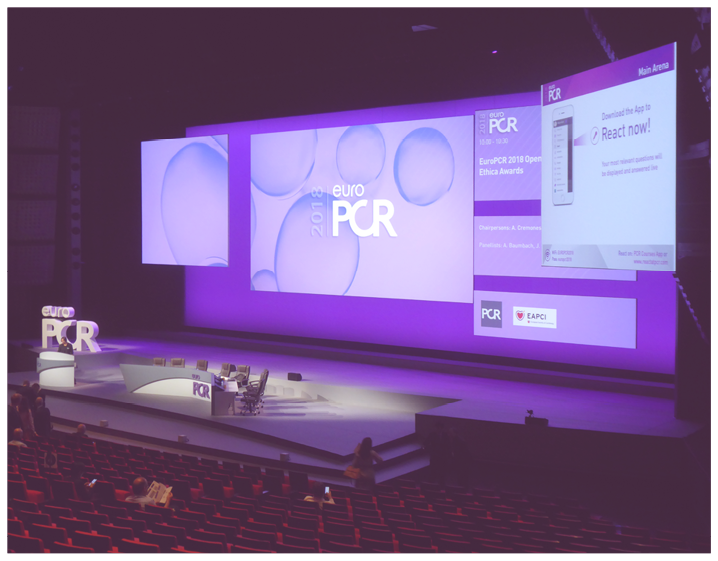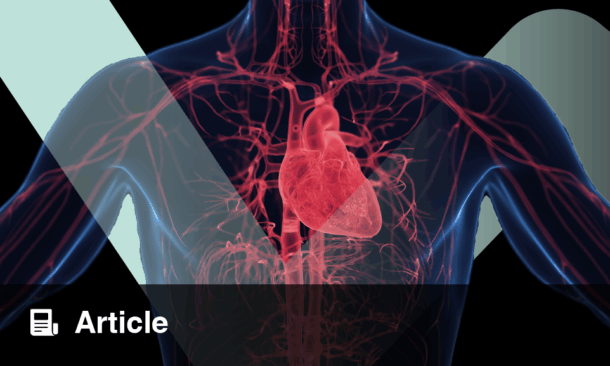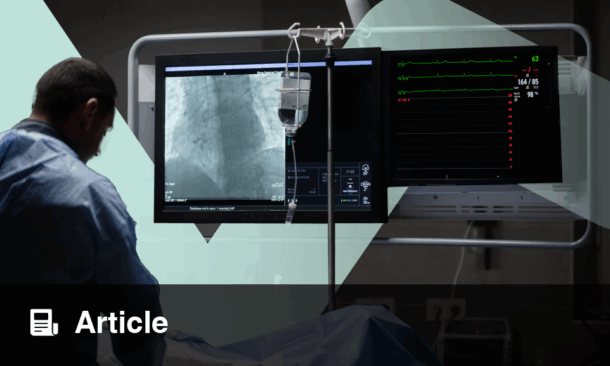Written by Harry Baldock | Editorial Administrator, European Medical Journal | @EMJHarryBaldock
![]()
You awaken in a hotel bed. It’s early, the Parisian sun just creeping above the high-rise buildings. You shower quickly and get dressed. A swift breakfast: a croissant (well, this is France after all) and a cup of coffee. You check your schedule. There’s so much to see, but thankfully you’re well prepared. The taxi is here. You check your camera and your notepad and you’re ready. It’s going to be a long day, but you wouldn’t miss it for the world.
This is interventional cardiology.
This is progress.
This is EuroPCR.

This year was my first time attending EuroPCR. Fresh-faced and optimistic, I was part of a delegation sent by the EMJ to absorb every ounce of wisdom and excitement that the congress had to offer, in order to relay it to you in the EMJ Interventional Cardiology 6.1 Congress Review. What follows is a brief recollection of my first day at the event, complete with useful tips to help you make the most of your visit to EuroPCR next year.
For the EMJ team, the congress starts bright and early. Press conferences take place from 8am and I was one of many sleepy-eyed reporters huddled around a cup of steaming coffee in the press room. We early birds were rewarded, however, with an exciting press release detailing the upcoming themes of the main sessions being presented throughout the day, including an update on the important ORBITA trial and the European Association for Percutaneous Coronary Intervention (EAPCI)’s official statement on PCI treatment for chronic coronary syndrome, presented by EAPCI President Prof Michael Haude.
My first tip relates to how you can keep abreast of this breaking information: social media is invaluable. Reporters will be sharing this information online as soon as the embargos have been lifted, so make sure to follow them on social media to receive the latest updates.
After getting a tantalising taste of what’s to come, we headed hungrily to the Opening Ceremony. The Grand Amphithéâtre was quickly filled with interventionalists and EuroPCR 2018 was introduced in earnest by Prof William Wijns and Prof Jean Fajadet, showcasing the innovative new session formats on offer, as well as formally presenting the Ethica Award.
Opening ceremonies offer wonderful insights into novel developments from the event’s scientific programme: i.e., what the congress organisers themselves are excited about. These sessions inevitably receive much attention, so make sure you arrive early to secure your seat. Additionally, sessions will already be running in tandem to the Opening Ceremony, so be sure to check your schedule carefully for early specialist sessions.
In the case of EuroPCR, the Opening Ceremony was a brief affair lasting just half an hour; the reason for this quickly became apparent. A live session from Bahrain was being broadcast on the big screen, with the opportunity to ask the practising interventionalists questions directly using the EuroPCR app. This was one of many such events being hosted at EuroPCR and proved to be easily as exciting as any sporting event, complete with gasps and applause from the audience as the interventionalists on show skilfully overcame complications.
This session continued for nearly 2 hours, ending around midday, and here it is worth noting the importance of something none of us can do without: food! With so much on offer around the clock, it is all too easy to forget how hunger hampers the learning process. Many sessions provide a complimentary lunch, as indicated on the schedule itself, so be sure to take full advantage of this offer.
Leaving the Grand Amphithéâtre, we were plunged directly into the bustling exhibitors floor, where companies of all shapes and sizes vied for the attention of the swirling delegates. As always, planning is imperative here, and floor plans are readily available online to guide you to your chosen companies.
Making our way through the milieu, we headed directly to the first of many unique opportunities on offer at EuroPCR, appropriately titled ‘Interactive Case Corner’. In contrast to the rooms designated for most of the sessions, this area was an open-plan presentation space set outside the Training Village, allowing delegates to wander by at their leisure. Unique cases were presented almost non-stop throughout the day amidst the hubbub of the congress atmosphere, allowing any passer-by to have their say.
Next up was another unique offering from the EuroPCR programme. ‘An Image is Worth a Thousand Words’ sessions allowed presenters to share their most puzzling images from clinical cases. I sat in awe as the room of interventionalists came together to collectively diagnose the condition and propose solutions, bouncing ideas off one another. This was certainly a learning experience and a highlight of EuroPCR for all involved.
Interactivity is a cornerstone of the learning process, a fact that is not forgotten by congress organisers. With so many lectures and presentations on show, be sure to set aside some time to attend more informal sessions like these, which afford a more direct interaction with the speakers and the subject matter.
Around mid-afternoon, I took the opportunity to talk with one of EMJ Interventional Cardiology’s venerable Editorial Board members, Dr Pablo Sepúlveda, and the transcript of our conversation can be found later in this journal. As Dr Sepúlveda pointed out, the wonderful research on show at congresses like EuroPCR is only part of the experience; it is the chance to network with peers from around the world that really brings the event to life.
When planning, it is integral to set aside some time for discussion with peers. Unique opportunities for collaboration are all around you. Experienced congress attendees will not only be able to provide you with great medical insight but can also help you refine your congress schedule. Be sure to find out what sessions the leaders of the field are interested in and why.
Finally, there was one last session of the day that I did not want to miss, amusingly called ‘PCR’s Got Talent’. I had not yet had the opportunity to take advantage of the vast array of excellent posters and abstracts provided at EuroPCR, most of which could be accessed by the touchscreen devices in the designated poster area, so this session was a great way to catch some research, fast! Attendees shared their research in rapid, 3-minute-long presentations, after which the audience and judging panel voted on which presentations should proceed to the next round.
While the late-breaking trials naturally take precedence in the congress schedule (and rightly so), the wealth of research available in the form of posters and abstracts is staggering. Sessions like PCR’s Got Talent, which shower attendees with a broad spectrum of topics, provide an excellent overview of the academic zeitgeist, as well as the areas on which up-and-coming researchers are focussing. If you would like the opportunity to present your prize-winning research to others, take the opportunity and try your luck in the various congress competitions.
The busy day finally drew to a close where it had started: back in the press room for another gripping press conference outlining the late-breaking trials to be revealed the following day. It had been a whirlwind of a day, but one thing was for certain: there would be plenty more to come.

The sheer scale of an international congress can sometimes make it seem like an impregnable fortress, but this is simply not the case. Here are my top five tips for unlocking the maximum congress experience:
1. Have a plan.
The congress’s academic programme is typically released around a month in advance, giving you plenty of time to decide which sessions you want to see. Specified pathways may or may not be constructed for you, but regardless, selecting a theme for your visit will help to keep your experience coherent and comprehensive.
2. Be flexible.
The schedules of large international congresses are inevitably fluid. Although rare, sessions may be cancelled or rescheduled, so keep an eye on the latest programme, which is often available directly from your mobile phone. Do not plan to attend back-to-back sessions all day, as this will see you stressfully rushing from one room to the next without any chance to catch your breath.
The congress centres can be large!
3. Make time for networking.
EuroPCR offers an unparalleled opportunity to interact with colleagues from all over the world. In many cases, you will only have the chance to meet with these people face-to-face once a year at this very event, so make sure you seize this unique opportunity.
4. Use the technology.
We live in a digital age and making good use of integrated technology can hugely augment one’s congress experience. The EuroPCR App is a great way to manage your schedule and keep abreast of the latest goings on. Likewise, social media platforms like Twitter provide an amazing source of real-time interaction with colleagues on congress topics (follow @EMJIntervention and use #EuroPCR). It’s a great way to discuss the highlights of parallel sessions that you couldn’t attend yourself, so don’t miss out.
5. Don’t worry.
It is impossible to see everything at a congress of this scale, but have no fear, the EMJ team are always on hand to provide a comprehensive review in the upcoming issue of EMJ Interventional Cardiology, published just 6 weeks after the congress. I truly hope you enjoy it.








